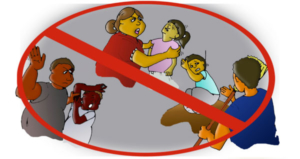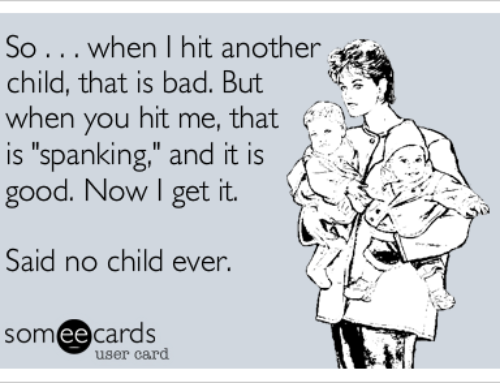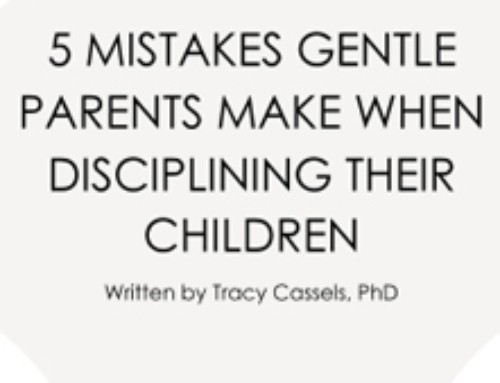The other day I opened up my beloved Science Daily to find the following headline: “Punishing a Child is Effective if Done Correctly”. After I managed to regulate my blood pressure, I went on to read the article for I had to know exactly what was going on. All the research I have read in recent years doesn’t support this view at all – from time outs to spankings, the evidence simply doesn’t suggest that punishment works as a means of proper socialization.
Unfortunately the research is not a paper (yet) but research presented at the American Psychological Association’s Annual Convention, so all I could go on was the actual write up provided by Science Daily. So what does it say?
Let me first start by being clear that the data reported far from supports regular punishments. This is good to know. So the headline is already misleading. The first researcher (this was a panel on discipline so various people spoke), from Oklahoma State University, looked at 102 mother-toddler dyads and interviewed parents about their discipline techniques—specifically punishment (time outs or taking things away, for example), compromises, and reasoning—over specific instances of “child misbehaviours”. These misbehaviours were hitting, whining, defiance, negotiating, or not listening. (If you’re thinking there’s a typo and that “negotiating” shouldn’t be on this list, you wouldn’t be insane, but you would be wrong. These researchers actually saw toddler negotiating as a type of misbehaviour. Go figure!)
In the immediate moment, compromise worked best for stopping all “misbehaviours”. Reasoning was second most effective for negotiating or whining. Punishments were second most effective for hitting or being defiant or not listening. However, this was only in the moment. In the long-term, there was a different pattern in terms of change in child behaviour; two months later, the same parents were interviewed about the prevalence of these behaviours and lo and behold, reasoning comes out on top for all behaviours. That is, parents who used reasoning had children who displayed these behaviours less two months later whereas parents who used compromise too frequently actually had children who were acting worse (of course we need to ask what they were worse at – all behaviours or are they better negotiators now and that’s seen as worse?). Where does punishment fall in here? Well, the researchers found that for a subset of children who were particularly defiant, moderate use (which was defined as less than 16% of the time) led to improvements in these particular children, but not others.
Returning to the headline, does this really support the use of punishment? Not really. For all kids, reasoning worked best, even though it didn’t always produce the results wanted in the moment, and this included hitting and other “defiant” behaviours. What of this finding that moderate punishment actually helped particularly defiant children? It’s hard to say without knowing more details of the specific behaviours, but when it includes things like taking something away, this may reflect taking something away that’s being used as a weapon, a very logical consequence for a child to bear (you can read up on logical consequences here). Or if a parent interprets time-ins as timeouts (which I have witnessed time and again when discussing timeouts on EP’s facebook page), they aren’t actually engaging in punishment, even though they might report using a “timeout”. Regardless, the findings pertaining to punishment should be taken in context. That is, they were helpful for a subset of toddlers and even then only when administered in low doses (I consider less than 16% to be a low dose) and combined with other techniques like reasoning. Hardly a call for more use of punishment.
Ideas and Comments About Punishment
Discipline Isn’t Punishment
The first comment I want to make is about some of the researchers whose work is quoted in here who have some pretty erroneous ideas about what constitutes punishment versus discipline. For example, the presenter from Oklahoma State University, Dr. Robert Larzelere, is quoted as saying, “Parental discipline and positive parenting techniques are often polarized in popular parenting resources and in parenting research conclusions”, before concluding that punishment can be used effectively. I take issue with the idea that “parental discipline” has to equal “punishment” here as this is not the origin of the word and results in a lot of misinterpretation about gentle discipline compared to mainstream authoritarian techniques.
For those that don’t know, the origin of “discipline” is as follows (from the Merriam-Webster dictionary): Middle English, from Anglo-French & Latin; Anglo-French, from Latin ‘disciplina’ teaching, learning, from ‘discipulus’ pupil. Sadly, our society has so lost track of the fact that discipline comes from the idea of teaching (why we study certain “disciplines”) that punishment is its sole use these days. However, if parents take the idea of teaching to heart, then it changes the way in which we approach our children’s behaviour and is likely one reason why reasoning was found to be the most effective form of discipline in the aforementioned research.
Are Timeouts Effective?
My second comment comes from the summary of timeouts as effective. One researcher, Dr. Ennio Cipani, argues that timeouts are very effective when done “correctly”, namely not spur-of-the-moment, but planned ahead and always followed through on. No research is cited specifically, but the cynic in me would point out that this is pure first-wave behaviourism that often fails when children are removed from the specific situation. Part of why these punishments are deemed to “fail” is that they often don’t involve the reasoning stage and thus children fail to learn why the behaviours are bad. This is not socialization. Further, it actually counters evidence that timeouts work in the long-term if there are no consequences to breaking the timeout. The research on the efficacy of timeouts depends upon harsh consequences, like spanking, for not complying with the timeout, thus it is unclear if children are afraid of the harsh consequence or if they have learned a lesson.
Compliance or Socialization?
Third, there is the issue of the focus on compliance. One Dr. Mark Roberts from Idaho State University (and actually one of the main researchers on the efficacy of timeouts) spoke about a method called the Hanf method of parenting. This method is based on a graded scale in which parents start with positive discipline, such as praise for good behaviour, and work towards more authoritarian techniques, such as timeouts, as the child doesn’t comply. Although this sounds nice and Dr. Roberts assures people that the number of timeouts decreases (though never is eliminated), it seems as though the focus remains compliance or obedience.
The Importance of Positive Connections
Finally, I want to comment on the importance of positive connection, discussed in part by Dr. David Reitman of Nova Southeastern University. In his presentation on punishment in clinical cases, he mentioned that people often ignore the therapists’ effort to promote positive connections with the child. This concerns me because it highlights an issue that is exemplified by the headline: People are ignoring the positive connection in hopes of easy punishment to alter behaviour, or gain compliance as discussed above. This is a problem and I would hope that people would realize how important a positive connection with a child is to their socialization and well-being.
I don’t know the exact techniques he uses with his own clients or what he studies, but the fact that he is cognizant of how important the connection is says the focus to parents needs to be turned away from punishment and towards the parent-child relationship. As he put it, “Therapists can help parents understand the problem, facilitate changes in the environment and help the children acquire the skills they need to become successful.” This is what all parents should be working towards and punishment doesn’t need fit into this framework, especially if parents know from the beginning how these types of changes take time and that the end-goal isn’t just compliance, but socialization.
In Conclusion
I would hope it’s clear that the data presented and the views shared hardly support a return to punishment as a means of socialization. If anything, I think the take-home message is that there will be cases in which parents use punishments sparingly and it helps them, depending on the child. This doesn’t mean they are necessary, but when used infrequently, they may help a parent, even if it’s just to give the parent a sense of control over the situation. I still maintain the end goal of helping families understand the problems, change environments, and help children gain skills – all mentioned by Dr. Reitman – is exactly what we need to focus more on when it comes to helping parents. And gentle parenting does all of these things and more.
If you’re interested in reading more on gentle discipline (which does not mean letting anything and everything slide), please check out these great books (clicking on the link will take you to your local Amazon where a purchase will provide EP with a small percentage of the sale, helping to cover the costs of the site):








I think that a big problem with this research seems to be that no difference is noted between discipline and punishments. I was chatting with a friend recently and mentioned that I don’t use punishment. She said that I did and cited a recent river walk she had accompanied me and my 2.5yo son on and said I punished him during the walk. My son and I often walk by the river and he likes to run ahead of us. When he first started asking to run ahead on these walks, I explained to him the dangers of the river and told him that in order to stay safe he had to stay on the footpath and off the grass bank as it would be too easy to fall from the grass into the water. I said that if I could trust him to always stay on the footpath (as the grass bank is very steep) and always stay where I could see him, he could run ahead. On the first couple of walks he tested me and stepped on the grass, he got one reminder to stay on the footpath and if he went on the grass again, I told him I was sorry but he would have to hold my hand for the rest of the walk. I didn’t admonish him, in fact I sympathised with his disappointment but explained why he needed to hold my hand that day and when he worked through his upset we went back to talking about the nice things were were seeing with no hard feelings on either side. The next day when he’d ask to run ahead again, I explained again about the dangers of the river, told him that he’d need to stay on the footpath and explained that if he couldn’t do that he’d have to come back and hold my hand again. After the first few walks he never set foot on the grass bank if we were alone but when walking with another person he’d try stepping on the bank again to see if the same rules applied in their company, a type of limit testing that I believe is common with children. This happened on the walk with the friend and my son had to hold hands with one of us for the rest of the walk after he stepped on the bank after the first reminder not to.
She interpreted that as punishment as in her understanding parents who don’t use punishment let their kids run riot and never impose any limits. The fact that I stopped my son from doing something he wanted meant that I must be punishing him. She really couldn’t get her head around the difference when I told her that I was setting what I hoped seemed like a logical consequence to him. That if he followed the safety rules he could have freedom to run about but if he didn’t then I would have to help him stay safe and that meant holding his hand. I think that a lot of parents acting as I did might even see that as a punishment. I don’t especially like making decisions that upset my son and when he was upset at not being allowed to run I felt as badly as I’m sure I would if I was imposing a time out. While in some cases people can do things that I would consider a punishment, like walking away and ignoring a tantrum, and not even think of that as a punishment at all. So not only is there probably a problem with the researchers questions but there is possibly a massive problem with how the parents may have answered them as any of those parents may have had completely polar views on what constitutes punishment in the first place.
I have noticed that my children misbehave when they are frustrated. They might be frustrated with one another, or frustrated with me or their dad or other adults, or frustrated with themselves. My older daughter pinches her younger sister, or one of them does something to get our attention because we are ignoring them, or they react to something we’ve done that embarrasses or annoys them. Punishing them for reacting to their frustrations seems counter-productive.
I’m all for reasoning. Calming them down, sitting them down, having a chat. Asking them why they think what they did was wrong. And crucially, asking them to think of ways to deal with the same problem if it arises again. I want them to learn empathy, kindness and effective communication skills and none of the forms of punishment you mention in your article are effective at nurturing those dispositions and skills.
A little anecdote from recently: A few weeks ago we were sitting at dinner with Grandma who was (I must say) being very annoying. She was pointing out what she found to be a rather annoying dinner table habit of my older daughter, who is six. Grandma went on and on, and I could see my daughter growing more and more embarrassed by having this negative attention focused on her. Eventually my daughter stuck her tongue out at Grandma – something she almost never ever does!! I told my daughter to apologise to Grandma, which she did, under duress. But then Grandma got angry with me for not sending my daughter to her room for being so naughty. While my six-year old’s reaction was wrong, it was caused by the provokation of her 67 year old Grandma who, frankly, should know better! It was a tricky situation, and I probably could have dealt with it better than I did, but it highlighted for me that adults are always blameless when it comes to the misbehaviour of children!
I really should proof-read before I hit ‘send’. Of course what I meant was, ‘adults aren’t always blamesless’. Silly me!!
If you have to take extra-special pains to ensure you’re “doing something correctly”, it is probably not something you should be doing. The right things to do are surprisingly easy most of the time.
[…] Uiteraard ook nog iets over opvoeding van Evolutionary Parenting: Does New Research Really Say Punishment Is Helpful? . […]
[…] uit. Ook zonder BBQ. Uiteraard ook nog iets over opvoeding van Evolutionary Parenting: Does New Research Really Say Punishment Is Helpful? . DE GULLE AARDE: zelf maken: hoofdpijn”brilletje”. Voor de hoofdpijnlijders die even […]